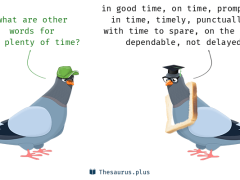return [riˈtəːn] n. 往返
* * *
A: That's a return ticket.
B: But I only want a one way ticket.
A:那是一张往返票。
B:但我只想要一张单程票。
* * *
train [trein] n. 火车
【派】training 培训
【搭】change trains 换乘火车
catch the train 赶火车
* * *
A: I like traveling by train.
B: Because it's safer, right?
A:我喜欢坐火车旅行。
B:因为那更安全,对吗?
* * *
platform [plætfɔːm] n. 站台
* * *
A: Which platform will the train leave from?
B: It will leave from Platform 3.
A:这班车从哪个站台开出呢?
B:从3站台出发。
* * *
plenty [ˈplenti] n. 大量
【派】plentiful 大量的
【扩】raff 大量 slather 大量
【搭】plenty of 大量 in plenty 很多
* * *
A: Have you seen the doctor?
B: Yes. She gave me some medicine and told me to get plenty of rest.
A:你去看病了吗?
B:看了。医生给了我一些药,让我多休息。
* * *
bar [bɑː] n. 酒吧
station [ˈsteiʃən] n. 车站,火车站
porter [ˈpɔːtə] n. 乘务员
* * *
A: If you need something, you can ask the porter for help.
B: How can I find him?
A:你需要什么东西的话,可以找乘务员帮忙。
B:我怎么才能找到他?
* * *
catch [kætʃ] v. 赶上
* * *
A: Can I catch the train?
B: It depends on the situation of the traffic.
A:我能赶上火车吗?
B:这取决于交通状况。
* * *
miss [mis] v. 错过
* * *
A: I don't want to miss the train.
B: Take it easy. Time is enough.
A:我不想错过那趟火车。
B:放心,时间足够。
verb [vi. 不及物动词]回来,回去;归还,退还;回报,回应;(感觉或情况)重新出现,恢复;重新开始,继续(某项活动);带来,产生 - There are unconfirmed reports that Aziz will return to Moscow within hours.
noun [抽象名词]回来,返回;归还,退回;重新开始,恢复;回报,收益;<英> 往返票,来回票;返回键,回车键 - Kenny explained the reason for his sudden return to Dallas.
adjective [原级](票)双程的,往返的;(旅途)返回的,返程的;(比赛)回访的;再度的,再次的 - Buy an extra ticket for the return trip.
① vi. 回,返回
- Tim has just returned from Australia. return to 回来
- return to China/Beijing 回到中国/北京
- He will go back from New York next month.
- He will return from New York next week.
- She will go back to China next week.
- She will return to China next week.
② vt. 把……送回,归还,退回
- He returned the books to the library. return to you 退回你
- return money =pay back =repay 还钱
- I am going to return the books.
- I am going to send back the books.
- He will return the coat.
- He will send back the coat.
noun [具体名词]火车,列车;(行进中的)行列,队列;随从,扈从;一系列,一连串(事件或想法);裙裾,拖裾;(转动的)轮系,齿轮组;(引爆炸药用的)导火线 - A train of vehicles, people, or animals is a long line of them travelling slowly in the same direction. (
verb [vi. 不及物动词]培训,训练;(为准备体育赛事而)操练;锻炼,培养(某一素质或能力);训(兽);(尤指用枪、照相机)对准,瞄准;使(植物)朝某方向生长,修整 - If someone trains you to do something, they teach you the skills that you need in order to do it.
noun [具体名词]平台;讲台,舞台;讲台上的人(the platform);(火车站的)月台;<英>(公共汽车上供乘客上下车的)踏脚台;发言机会,论坛;契机;(政党的)纲领;厚底鞋;计算机平台;(海上)钻井平台;(供人上下小船的)水上平台;(火箭或导弹的)卫星发射平台 - Nick finished what he was saying and jumped down from the platform.
- Platform 4 四站台
- Line 16 地铁线
- Room 438 房间号
noun [专属名词](公共汽车、火车等的)车站;电视台,广播电台;站,所,局;<旧>社会地位,身份;须坚守的位置,岗位;驻地,基地;(电台或电视的)频率,频道;(澳大利亚或新西兰的)大牧场 - I get off at the next station.
verb [vt. 及物动词]驻扎,派驻;派往,安置在 - The train drew into the station.
noun [抽象名词]富裕,充裕 - We talked plenty about our kids.
pronoun [指示代词]大量,众多 - We had food and drink in plenty.
adverb [程度副词]大量,很多;<非正式>非常,十分;<非正式>足够有余 - The city has plenty of open space.
plenty of
- A.用于肯定句
- B.可接可数名词 & 不可数名词
- plenty of time
- plenty of eggs
谓语动词一致
- There is plenty of room for everyone.
- There are plenty of rooms for everyone.
noun [具体名词]酒吧;吧台;小吃店;块,棒;栏杆,闩;障碍;小节;功能条;球门横梁;条纹,带;律师职业;(法庭中的)法庭围栏,被告席(the Bar);沙洲,暗礁;军阶杠;电热棒;巴(气压单位) - A bar is a room in a hotel or other establishment where alcoholic drinks are served. (
verb [vt. 及物动词]阻止,禁止;阻挡,拦住;封,堵 - If you bar a door, you place something in front of it or a piece of wood or metal across it in order to prevent it from being opened.
preposition [方式和原因]除了…以外 - What is your favourite chocolate bar?
verb [vt. 及物动词]接住;抓住,捉住;扶住(要倒的人);逮住,捕获;(尤指设置陷阱)捕捉;撞见(某人)犯罪(或做错事);(被)钩住,(被)绊住;击中,触到(某人或某物) - Police say they are confident of catching the gunman.
noun [专属名词]接住,截住(某物,尤指球);(鱼的)捕获量,捕获物;<旧>理想的丈夫(或妻子),合适的合作伙伴;搭扣,把手 - He missed the catch and the game was lost.
① vt. 捉住,逮住,捕获
- The police have caught the thief.
- Have you caught any fish today?
② vt. 抓住,握住
- Can you catch the ball?
③ vt. 及时赶到,赶上
- catch a bus 赶车
- I want to catch the eight nineteen (train) to London.
- He ran quickly to catch the last bus home.
- When she caught up with them, she saw that they were going through the contents of the bag.
④ catch 的一些固定用法
- catch a cold 染上感冒
- catch one's breath 摒住呼吸
- catch sight of = see 看见catch fire 着火
- catch one's eyes 吸引某人注意力
noun [专属名词]小姐(未婚女子)、女士,年轻未婚女子 - an unmarried woman or girl, esp a schoolgirl
verb [vt. 及物动词]想念,未击中,不懂;未做,错过 - If you miss a chance or opportunity, you fail to take advantage of it.
noun [专属名词](尤指法国的)地铁,地铁系统;大城市;麦德龙(Metro) - A new metro runs under the square, carrying hundreds of thousands who used to cycle to work.
adjective [原级]大都会的,大城市的 - Living in France, I take the metro every day.
noun [具体名词]<美>地铁;<英>地下通道 - A subway is the same as an .
verb [vi. 不及物动词]乘地铁 - He prefers travelling on the subway to riding in a limousine.









